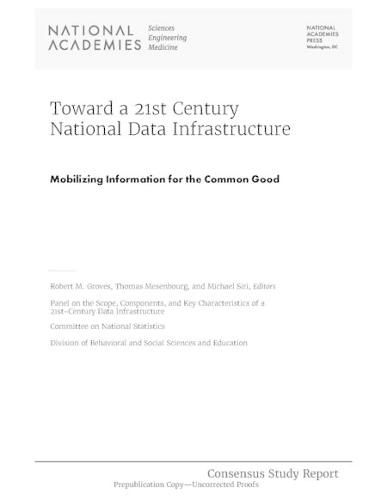Readings Newsletter
Become a Readings Member to make your shopping experience even easier.
Sign in or sign up for free!
You’re not far away from qualifying for FREE standard shipping within Australia
You’ve qualified for FREE standard shipping within Australia
The cart is loading…






Historically, the U.S. national data infrastructure has relied on the operations of the federal statistical system and the data assets that it holds. Throughout the 20th century, federal statistical agencies aggregated survey responses of households and businesses to produce information about the nation and diverse subpopulations. The statistics created from such surveys provide most of what people know about the well-being of society, including health, education, employment, safety, housing, and food security. The surveys also contribute to an infrastructure for empirical social- and economic-sciences research. Research using survey-response data, with strict privacy protections, led to important discoveries about the causes and consequences of important societal challenges and also informed policymakers. Like other infrastructure, people can easily take these essential statistics for granted. Only when they are threatened do people recognize the need to protect them.
Toward a 21st Century National Data Infrastructure: Mobilizing Information for the Common Good develops a vision for a new data infrastructure for national statistics and social and economic research in the 21st century. This report describes how the country can improve the statistical information so critical to shaping the nation's future, by mobilizing data assets and blending them with existing survey data.
Table of Contents
Front Matter Summary 1 Introduction 2 The United States Needs a New National Data Infrastructure 3 A Vision for a New National Data Infrastructure 4 Blended Data: Implications for a New National Data Infrastructure and Its Organization 5 Building a 21st Century National Data Infrastructure Requires Identifying Short- and Medium-Term Activities References Appendix A: Biographical Sketches of Panel Members Appendix B: Workshop Agendas Committee on National Statistics
$9.00 standard shipping within Australia
FREE standard shipping within Australia for orders over $100.00
Express & International shipping calculated at checkout
Historically, the U.S. national data infrastructure has relied on the operations of the federal statistical system and the data assets that it holds. Throughout the 20th century, federal statistical agencies aggregated survey responses of households and businesses to produce information about the nation and diverse subpopulations. The statistics created from such surveys provide most of what people know about the well-being of society, including health, education, employment, safety, housing, and food security. The surveys also contribute to an infrastructure for empirical social- and economic-sciences research. Research using survey-response data, with strict privacy protections, led to important discoveries about the causes and consequences of important societal challenges and also informed policymakers. Like other infrastructure, people can easily take these essential statistics for granted. Only when they are threatened do people recognize the need to protect them.
Toward a 21st Century National Data Infrastructure: Mobilizing Information for the Common Good develops a vision for a new data infrastructure for national statistics and social and economic research in the 21st century. This report describes how the country can improve the statistical information so critical to shaping the nation's future, by mobilizing data assets and blending them with existing survey data.
Table of Contents
Front Matter Summary 1 Introduction 2 The United States Needs a New National Data Infrastructure 3 A Vision for a New National Data Infrastructure 4 Blended Data: Implications for a New National Data Infrastructure and Its Organization 5 Building a 21st Century National Data Infrastructure Requires Identifying Short- and Medium-Term Activities References Appendix A: Biographical Sketches of Panel Members Appendix B: Workshop Agendas Committee on National Statistics